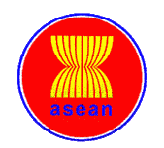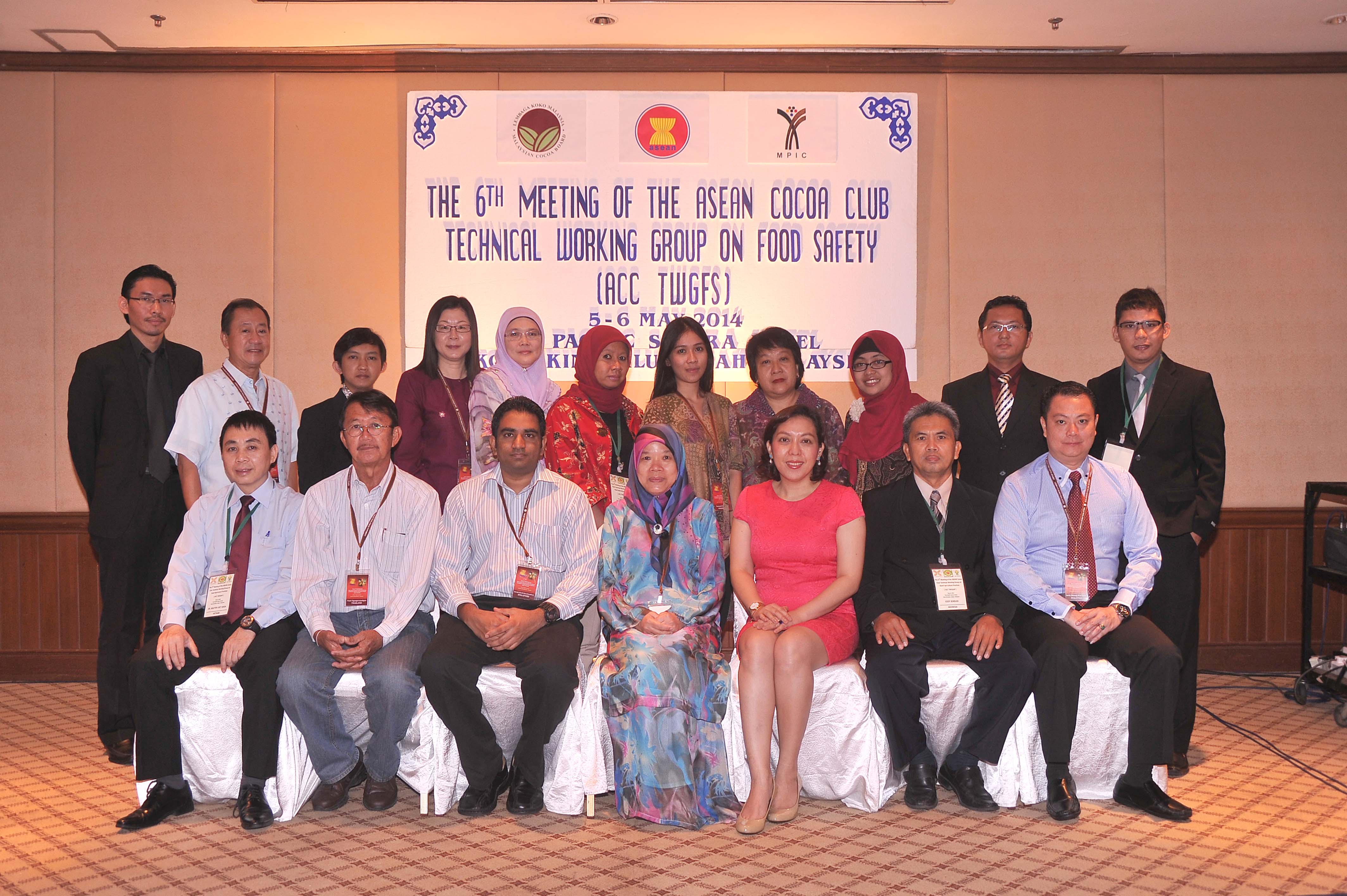

REPORT OF THE THIRD MEETING OF THE ASEAN COCOA CLUB
TECHNICAL WORKING GROUP ON FOOD SAFETY (ACC TWGFS)
6th May
2014
The Pacific Sutera Hotel,

INTRODUCTION
- The Sixth Meeting of the ASEAN Cocoa Club Technical Working Group on Food Safety (ACC TWGFS) was held on 6th May 2014 in The Pacific Sutera Hotel, Kota Kinabalu, Sabah, Malaysia.
- The Meeting was chaired by Dr. Sabariah Samsudin, Director of the Cocoa Downstream Technology Division, Malaysian Cocoa Board and co-chaired by Ms. Karen Kristine A. Roscom, OIC-Executive Director, Bureau of Agriculture and Fisheries Standards, Department of Agriculture, Philippines.
- The Meeting was attended by 14 members and observers from Indonesia, Malaysia, Philippines, Singapore and Secretariat of the ACC TWGFS. The list of delegates appears as ANNEX I.
AGENDA ITEM 1: WELCOMING REMARKS
- The Chairperson of the ACC TWGFS, Dr. Sabariah Samsudin, Director of Cocoa Downstream Technology Division, Malaysian Cocoa Board (MCB) welcomed the delegates to Malaysia and the 6th Meeting of the ACC TWGFS. The full text of her speech appears as ANNEX II.
AGENDA ITEM 2: ELECTION OF VICE-CHAIRMAN
- Ms. Karen Kristine A. Roscom, OIC-Executive Director, Bureau of Agriculture and Fisheries Standards, Department of Agriculture, Philippines was unanimously elected as the Vice-Chairperson of the 6th Meeting of the ACC TWGFS.
AGENDA ITEM 3: ADOPTION OF AGENDA
- The Meeting adopted the Agenda for the 6th Meeting of the ACC TWGFS which appears as ANNEX III.
AGENDA ITEM 4: BUSINESS ARRANGEMENT
- The Meeting was held in plenary.
AGENDA ITEM 5: REPORT ON THE CURRENT STATUS OF THE COUNTRY’S INITIATIVES RELATIVE TO FOOD SAFETY ON COCOA AND COCOA PRODUCTS AND RELATED ACTIVITIES
- Indonesia reported that there was no detection on cypermethrin during the monitoring on pesticide residues in five provinces for the year 2013.
- Malaysia informed the Meeting that the draft of the Malaysian Standard (MS) for Chocolate and Chocolate Products-Sampling and Test Methods has no progress for 5 years. As the result, the drafted standard was cancelled automatically. Malaysia proposed to drop this agenda item for the coming meeting and agreed by the Meeting.
- Philippines informed that the monitoring of Ochratoxin A (OTA) in Philippines cocoa beans and cocoa products, and the Pilot Testing of a Traceability System for Philippines Cacao Beans Project were completed in year 2013. Philippines proposed to drop this agenda item for the coming meeting and agreed by the Meeting.
- Malaysia also informed the Meeting on the Food Safety measures undertaken by Malaysia on imported food products including raw materials and related ingredients under the Food Act 1983 and Food Regulations 1985. The full report appears as ANNEX IV.
- Philippines also reported on their national initiatives related to food safety of cocoa since May 2013 as well as the upcoming activity for year 2014. The major activities were as follow:
- Philippine Food Safety Act of 2013;
- Three (3) latest approved Philippine National Standards related to cocoa in 2013; and
- Proposed capacity building activity related to cocoa in 2014.
The full report appears as ANNEX V.
- Philippines expressed their concern pertaining to the incorporation of cocoa shell into cocoa powder that can affect the quality and food safety of the cocoa powder.
- Philippines informed the Meeting that significant amount of Ochratoxin A resides in the shells. If there are products containing high amount of cocoa shells, Ochratoxin A may be an issue. The Chairperson requested Philippines to provide more information on shell in cocoa powder.
AGENDA ITEM 6: STATUS REPORT ON THE FOOD SAFETY REQUIREMENTS IMPOSED BY IMPORTING COUNTRIES
Indonesia reported on 1st February 2013, there was a meeting of technical experts from European Commission (EC) Member states, convened by Directorate General for Health and Consumer Affairs (DG SANCO) to review on the maximum limits of cadmium in cocoa and chocolate products. Indonesia informed the Meeting that the level of cadmium in “Chocolate with ≥ 50% total dry cocoa solids” was revised from 0.6 mg/kg to 0.8 mg/kg. The revised legislation would be applicable from 1st January 2018, corresponding to a transitional period of about four to five years.
AGENDA 7: REPORT ON THE ISSUES OF IMPORTANCE RELATED TO FOOD SAFETY
- Indonesia reported on the monitoring of cadmium in cocoa bean carried out in 2013. Samples were taken from 5 (five) provinces: Bali, South Sulawesi, South East Sulawesi, Central Sulawesi and West Sulawesi. Results of monitoring for cadmium was 0.0526 mg/kg (minimum) and 0.303 mg/kg (maximum). The average concentration was 0.1 mg/kg with limit of detection (LOD) of 0.015 mg/kg.
The references used for the monitoring of cadmium are as follows:
- Indonesia National Standard (SNI 2323-2008); Cocoa Bean
- Indonesia National Standard (SNI 2323-2008) Amd 1-2010; Cocoa Bean
- Indonesia National Standard (SNI 19-0428-1998); Guidelines Sampling for Solid, Semi Solid and Liquid
- Indonesia National Standard (SNI 7387-2009); Maximum Limit Contamination of Heavy Metal in Food
- Malaysia informed the Meeting on the monitoring of cadmium content in cocoa powders produced by Malaysian cocoa grinders. The cadmium content for natural and alkalized cocoa powder are ranged from not detected (at 0.005 mg/kg) - 0.68 mg/kg and 0.12-0.75 mg/kg respectively. The cadmium content for both products is compliant with the requirement of Malaysian Food Act 1983 and Regulations 1985 (maximum permitted level: 1 mg/kg).
- Philippines informed the Meeting that there are some samples tested for cadmium. However, Philippines would like to verify on the method validation. Therefore, no data can be provided in this Meeting at the moment.
- Singapore informed the Meeting that they will get the data from the current grinder in Singapore and will present in the next Meeting.
- Malaysia and Philippines shared the same view of the usefulness of the data provided by the ASEAN Member States. Philippines also stated that the data would be useful for future work.
AGENDA 8: STATUS REPORT ON THE DEVELOPMENT OF DATABASE ON FOOD SAFETY
The ACC TWGFS Secretariat informed the Meeting on the current status of the uniform resource locator (URL) for the ASEAN Member States food safety website which can be hyperlinked from the ACC TWGFS website. It was noted that Brunei Darussalam, Indonesia, Lao PDR, Myanmar, Thailand yet to provide the URL for their food safety website. The Secretariat urged the above mentioned members to submit instantly.
- Malaysia informed the Meeting that data on thirteen (13) pesticide residues in cocoa beans; cadmium and lead in cocoa beans; and microorganisms count, yeast and mold count in cocoa and chocolate products have been uploaded to the ACC TWGFS website.
- The chairperson informed the ASEAN Member States that the database had been developed since 2010. Up-to-date, only few of the ASEAN Member States had committed to upload their data on food safety website.
Therefore, the Chairperson proposed as follows:
- Drop this agenda for the coming meeting if agreed by the ASEAN Member States or,
- If disagreed by the ASEAN Member States, only those ASEAN Member States which committed to upload their data are assessable to the database
- All ASEAN Member States agreed to retain the database in the website and committed to upload the data.
AGENDA 9: KNOWLEDGE AND EXPERTISE SHARING ON TESTING METHODOLOGIES
- There were no other matters raised for discussion.
AGENDA 10: HARMONIZATION ON THE FOOD SAFETY REQUIREMENTS OF THE ASEAN MEMBER COUNTRIES
- Philippines as the lead country of the Working Group (WG) briefed on the final document of the ASEAN Code of Practice (CoP) for the Prevention and Reduction of Ochratoxin A(OTA) Contamination in Cocoa Beans which appears as ANNEX VI.
- The Meeting agreed to adopt the ASEAN Code of Practice (CoP) for the Prevention and Reduction of Ochratoxin A(OTA) Contamination in Cocoa Beans and will forward the final document to the 17th Meeting of the National Focal Points for ASEAN Cocoa Club (ACC) on Joint ASEAN Cooperation in Agriculture and Forest Products Promotion Scheme for endorsement.
- The Meeting noted the suggestion made by Indonesia to harmonize the definitions used in the ASEAN Code of Practice (CoP) for the Prevention and Reduction of Ochratoxin A(OTA) Contamination in Cocoa Beans with ASEAN Standard for Cocoa Bean (ASEAN Stan 34:2014) which was developed by the Task Force on ASEAN Standards for Horticultural Produce and Other Food Crops, and will be endorsed by the ASEAN Sectoral Working Group on Crops in 2014.
AGENDA 11: OTHER MATTERS
- Malaysia informed the Meeting on the Cocoa Safe Project: Capacity Building and Knowledge Sharing in Sanitary and Phytosanitary (SPS) in Cocoa in South East Asia which appears as ANNEX VII.
- Philippines reminded the Meeting on the issue raised by Thailand during the working group discussion on issues that relate to personal hygiene in cocoa production. Malaysia suggested to cross check with Technical Working Group on Good Agriculture Practice (TWG GAP) whether any work that had been initiated on personal hygiene. If issues on personal hygiene are not covered by the TWG GAP, a new initiative may be proposed to develop a Code of Hygienic Practice for Cocoa.
AGENDA 12: ADOPTION OF THE REPORT
- The Meeting unanimously adopted the Report of the Sixth Meeting of the ASEAN Cocoa Club Technical Working Group on Food Safety (ACC TWGFS) held on 6th May 2014 in Kota Kinabalu, Sabah, Malaysia.
ACKNOWLEDGEMENT
- The Chairperson of the ACC TWGFS expressed her gratitude and thanks to all delegates for their active participation in the Meeting.
- The delegates from Indonesia, Philippines and Singapore expressed their sincere appreciation to the government of Malaysia for the excellent arrangements made for the Meeting and the warm hospitality accorded to them.
- The hosting country expressed their gratitude to the delegates for their efforts and contributions to make this meeting a success.
- The Meeting was held in the traditional spirit of ASEAN cordiality and solidarity.
Sabah, Malaysia
6th May 2014
Click here to download PDF format